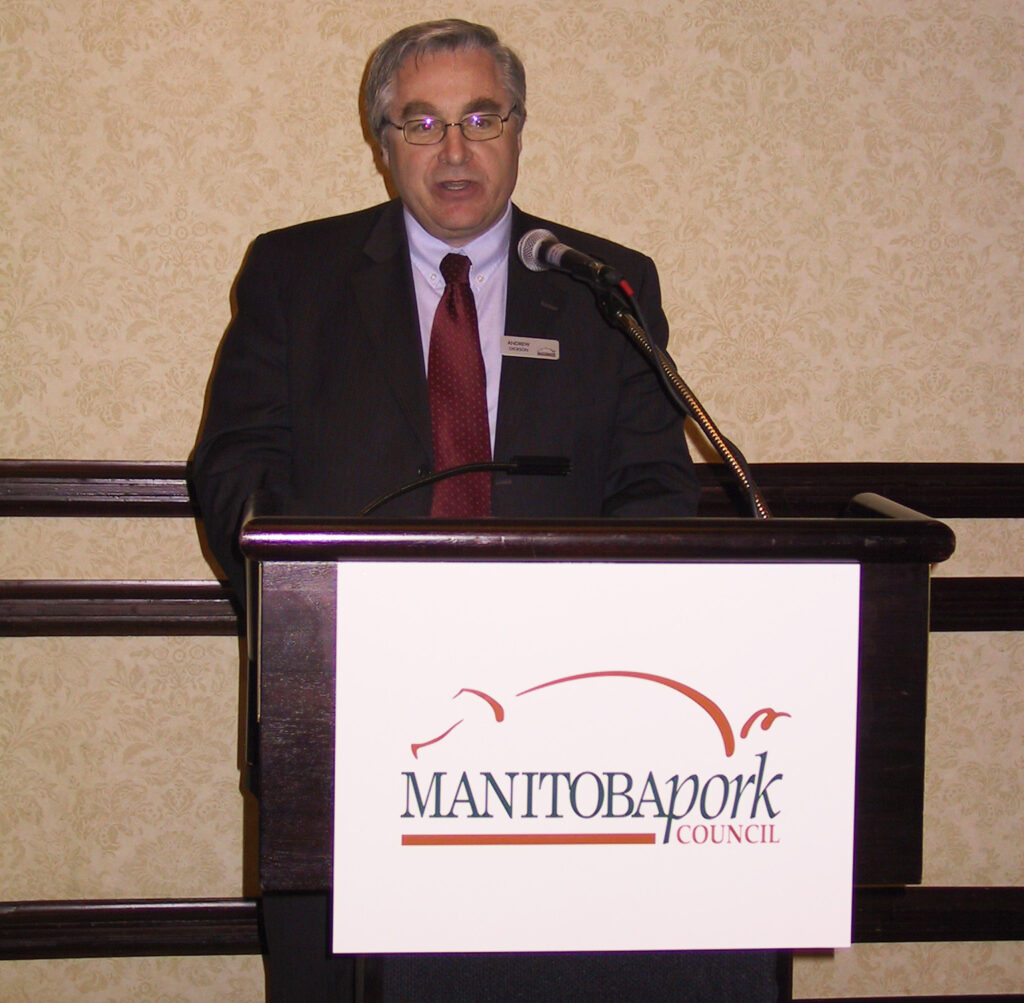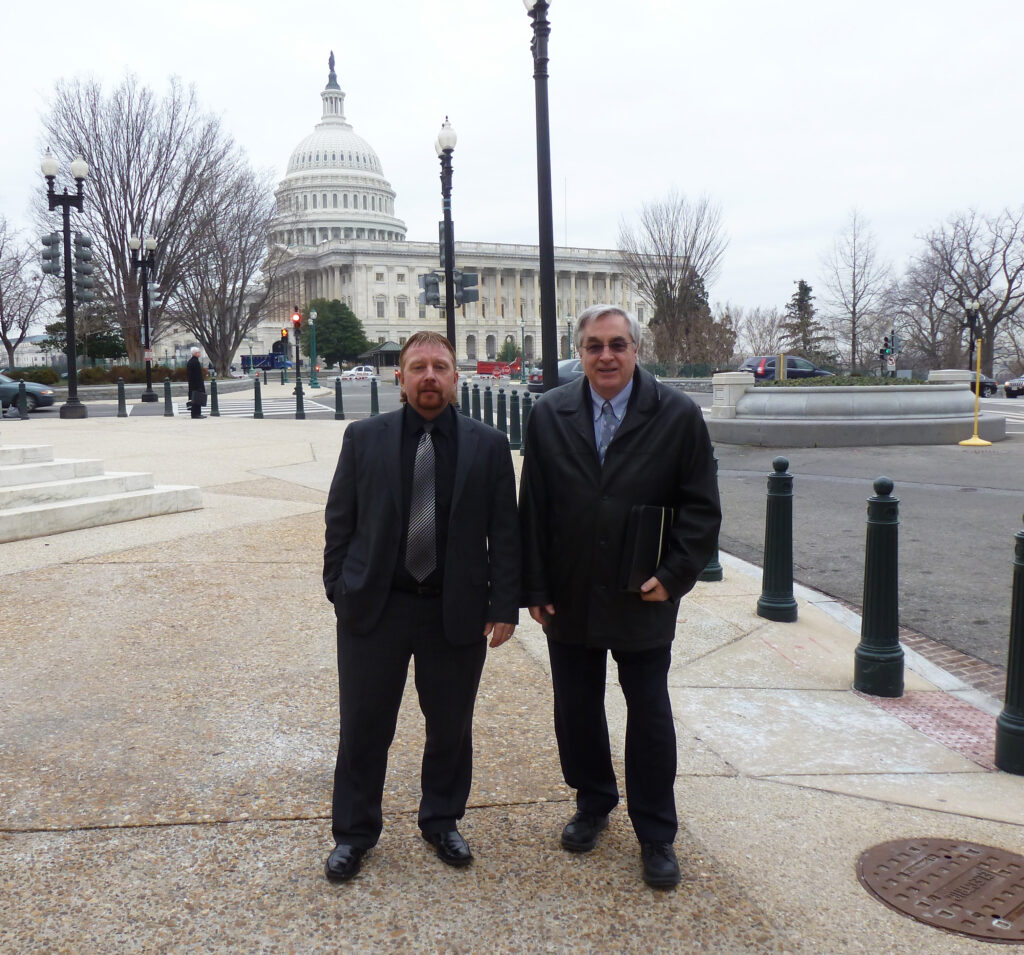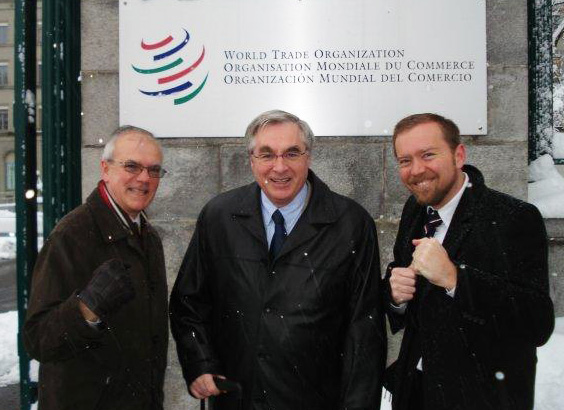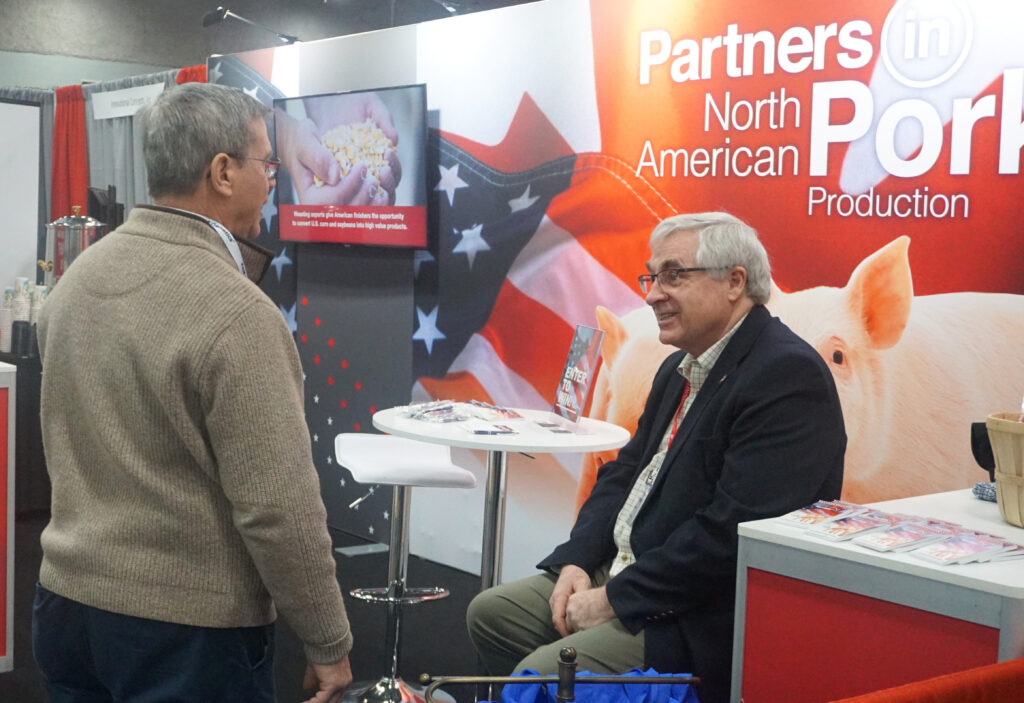By Joey Dearborn
Editor’s note: Joey Dearborn is the communications coordinator for Manitoba Pork. He can be contacted at jdearborn@manitobapork.com.
After 16 years at the helm of Manitoba Pork as the organization’s general manager, Andrew Dickson has decided to move on. Dickson’s journey in agriculture began nearly half a century ago and has shaped the Canadian pork industry in many positive ways.
Agriculture flows through Dickson’s blood

Andrew Dickson’s journey to Manitoba from England – with his agriculture degree from the University of Reading in hand – started in 1974 with a ‘help wanted’ ad soliciting farm workers to come to the province as part of the Manitoba Farm Labour Pool. Dickson set aside his goal of becoming a manager for a British bank in favour of a seasonal job on a large dairy farm near Dauphin and a notional plan to eventually move to Australia or South Africa.
“Late that fall, through the Farm Labour Pool manager, I met the regional director from Manitoba Agriculture at the time, who told me that he had two positions open for agriculture representatives – one in Ste. Rose and one in Russell,” said Dickson. “I asked the farmer, who had relatives in England, and he said that he would go to Russell, because there were more English people there!”
After a short trip back to England and a visit to the High Commissioner’s office in London to get his immigration papers, where he was advised to “buy a pair of sunglasses to avoid snow blindness and keep [his] T4 slips,” Dickson made the permanent move to Canada. From his first posting in Russell, he transferred to Stonewall, in 1977, as an agriculture representative. In 1981, he changed roles, becoming the province’s chief of the 4-H and Youth Programs, moving again, in 1983, to Arborg as the regional director for the Interlake region, and finally to Beausejour, in 1991, with responsibility for the Interlake-Eastern region.
“I spent almost 30 years in agricultural extension, but we also had to deal with floods in the Red River Valley, with prairie fires in Ashern, flooding around Arborg and Fisher Branch, and droughts across the regions,” said Dickson. “The 1980s were a hard time in agriculture in Manitoba in terms of crops. People were losing a lot of money. We organized suicide workshops at one point. It was a big adjustment period, because there was a lot of new technology, in terms of machinery, new crops and farm chemicals. In the 1990s, there was a massive expansion in the pork business with hundreds of new barns built on a scale never seen before. I was very involved in the development of the regulations dealing with local planning and environmental protection.”
As the industry evolves, so does the organization

Joining Manitoba Pork in 2005, Dickson has been at the forefront of many new programs and services when it comes to food safety and disease management, labour shortages, financial challenges and resolving sometimes-thorny political issues in Manitoba related to new barn developments and ending the moratorium on expansion, in addition to dealing with the fallout of trade issues in North America and around the world.
“I came to Manitoba Pork at a time when the organization had changed from being a single-desk marketing agency into an industry sector organization,” said Dickson. “The job was to represent the organization and put in programs and services that would benefit the industry as a whole.
“The board of directors asked me to move the emphasis from the public and industry relations side toward the producer services and business development side, because they wanted to be more involved in supporting hog production on-farm.”
Global trade is an issue that has remained top-of-mind throughout Dickson’s tenure. In the year before he took over the general manager role, the U.S. moved to enact a countervailing duty on Canadian hog imports. Canada won the subsequent trade case and was able to move forward with continued exports to a strong trading partner.
“When I arrived, we were still in the middle of a trade case with the U.S., and that April, we got the results that we won the case,” said Dickson. “One of our first objectives was to repair relationships with our U.S. counterparts, especially in Iowa and Minnesota, because we shipped a lot of iso-weans and feeder pigs there. We initiated a new program to get down there and be visible, getting to know the Americans and their issues with us. We’ve come a long way, and it’s now part of our regular activities.”
Dickson noted that the importance of the U.S. market cannot be overstated, and that his successor needs to keep trade relationships as a top priority, as “you cannot make assumptions when it comes to building these relationships.”
Dickson instrumental in navigating industry issues

Following Canada’s successful trade challenge, the U.S. moved to enact mandatory country-of-origin labelling (mCOOL). After eight years of appeals to the World Trade Organization (WTO), Canada won the case in May 2015, and the U.S. Congress scrapped the mCOOL policy soon after. It took numerous trips to Geneva, Switzerland and Washington, D.C. not only to support the Government of Canada’s efforts to overturn mCOOL, but also to encourage U.S. politicians to change the legislation. The support of the U.S. pork industry was crucial to ultimate success.
Dickson also suggested that it is crucial to work together with producers and organizations across western Canada, because of how interlinked the industry is. He cautioned that provinces cannot go it alone when it comes to a strategy for building a stronger sector.
“For example, the federal and provincial governments have been very good over the last couple decades in terms of supporting the industry in accessing foreign labour. We are a high-turnover industry, so we have to replace labour, and our country is short on labour all the time.”
Dickson also sees labour as having a great benefit to many rural communities across the province, not just in Winnipeg. He noted that many communities want new hog operations and often approach Manitoba Pork for assistance because of the diversity new workers bring to their small towns.
A major issue close to home was the decision by the Government of Manitoba to enact a hog moratorium on new expansions and barns across the province, around the same time as Manitoba Pork was working to establish a new processing facility in Winnipeg.
“Our relationship with the government of the day was deteriorating rapidly,” said Dickson. “The board of directors wanted to push back against the moratorium, and they wanted to tell the government that this is very bad for rural Manitoba – it’s very bad for our industry, it’s bad for the province and there’s no science behind this. We decided to call the government out on it.”
In 2006, as part of a Clean Environment Commission review, barn expansions were paused. In 2008, the government introduced Bill 17, which effectively banned barns in all or parts of 35 municipalities. In 2011, the provincial government went further, essentially banning new hog barns across the province under the guise of protecting Lake Winnipeg.
“It’s hard to imagine that we had producers picketing on the front steps of the Legislature,” said Dickson. “It was unheard of in Manitoba – senior businessmen picketing like that.”
Dickson makes his mark on the future

After the 2016 Manitoba provincial election, the new provincial government ended the hog barn moratorium and enacted new changes to municipal planning, leaving municipalities in charge of many of the governing regulations.
“The new government brought in new rules about how barns would get approved in the province, continuing to protect the environment but dropping the moratorium.”
Going forward, Dickson indicated that bringing new producers into hog farming is paramount, and that there is a real opportunity in having crop producers invest in the industry and use manure to offset the use of synthetic fertilizers.
In terms of Dickson’s advice to his successor, it boils down to the team you have around you.
“As a manager, you have to recruit and develop your staff, and give them a lead on issues. You have to be creative and innovative in your programming. You have to work with funding agencies like the provincial and federal governments on projects that will be of significant benefit to agriculture as a whole. You also really have to be focused on your relationship with governments and the public, because they have to be able to trust us to do the right thing in raising pigs and producing pork. We have to address their concerns while building the business.”
At a trade show in Iowa, the former head of the Iowa Pork Producers Association reminded Dickson that there is “never a dull day in the hog industry.” Dickson has seen his fair share of those days in agriculture, but he remains hopeful and optimistic about the sector, as he begins another chapter in his life.
“Pork is the most popular meat choice in the world, and Manitoba is ideally suited to the production of high-quality pork products,” said Dickson. “There is plenty of room to double the industry and create good jobs and wealth for the province. Smart investments and confidence in the future are the keys to success. I am proud to be a Canadian. Canada really is the best country in the world, but we can’t rest on past success. We have to work at it all the time.”




